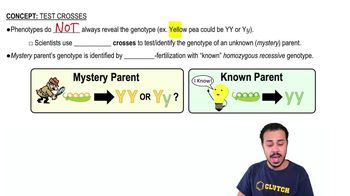The possibility of extensive genetic testing raises questions about how personal genetic information should be used. Should the information be available to insurance companies? Why or why not?
Ch. 12 DNA Technology and Genomics
Chapter 12, Problem 15e
The possibility of extensive genetic testing raises questions about how personal genetic information should be used. Might some people avoid being tested for fear of being labeled genetic outcasts?
 Verified step by step guidance
Verified step by step guidance1
Identify the ethical concerns related to genetic testing, such as privacy, discrimination, and psychological impact.
Discuss the potential benefits of genetic testing, including early disease detection, personalized medicine, and family planning.
Explore the role of legislation and policies in protecting individuals from discrimination based on genetic information.
Consider the psychological implications and societal impacts of being labeled based on genetic predispositions.
Evaluate the importance of genetic counseling and education to help individuals make informed decisions about genetic testing.

Verified video answer for a similar problem:
This video solution was recommended by our tutors as helpful for the problem above.
Video duration:
1mWas this helpful?
Key Concepts
Here are the essential concepts you must grasp in order to answer the question correctly.
Genetic Testing
Genetic testing involves analyzing an individual's DNA to identify genetic disorders, predispositions to diseases, or carrier status for certain conditions. This process can provide valuable information for personal health management but also raises ethical concerns regarding privacy and discrimination.
Recommended video:
Guided course

Test Crosses
Genetic Stigmatization
Genetic stigmatization refers to the social labeling and discrimination that individuals may face based on their genetic information. This can lead to individuals being perceived as 'genetic outcasts' if they carry genes associated with certain diseases, potentially affecting their social interactions and mental health.
Recommended video:
Guided course

Genetic Code
Ethical Implications of Genetic Information
The ethical implications of genetic information encompass issues such as consent, privacy, and the potential for misuse of genetic data. As genetic testing becomes more common, it is crucial to consider how this information is shared and used, ensuring that individuals' rights are protected and that they are not unfairly judged based on their genetic makeup.
Recommended video:
Guided course

Genetic Code
Related Practice
Textbook Question
566
views
Textbook Question
The possibility of extensive genetic testing raises questions about how personal genetic information should be used. Is there any reason for the government to keep genetic files?
530
views
Textbook Question
The possibility of extensive genetic testing raises questions about how personal genetic information should be used. Is there any obligation to warn relatives who might share a defective gene?
519
views
Textbook Question
The possibility of extensive genetic testing raises questions about how personal genetic information should be used. Or might they be compelled to be tested against their wishes? Can you think of other reasons to proceed with caution?
515
views
Textbook Question
The possibility of extensive genetic testing raises questions about how personal genetic information should be used.
586
views
Textbook Question
SCIENTIFIC THINKING Scientists investigate hypotheses using a variety of methods, depending on the circumstances behind the research. Human nutrition studies (such as those studying whether GMO foods have any health effects) are particularly problematic. Can you design a hypothetical human nutrition study to test whether GMO corn is less healthy than traditional corn? Can you identify real-world problems that may interfere with your design and confound your results?
678
views
